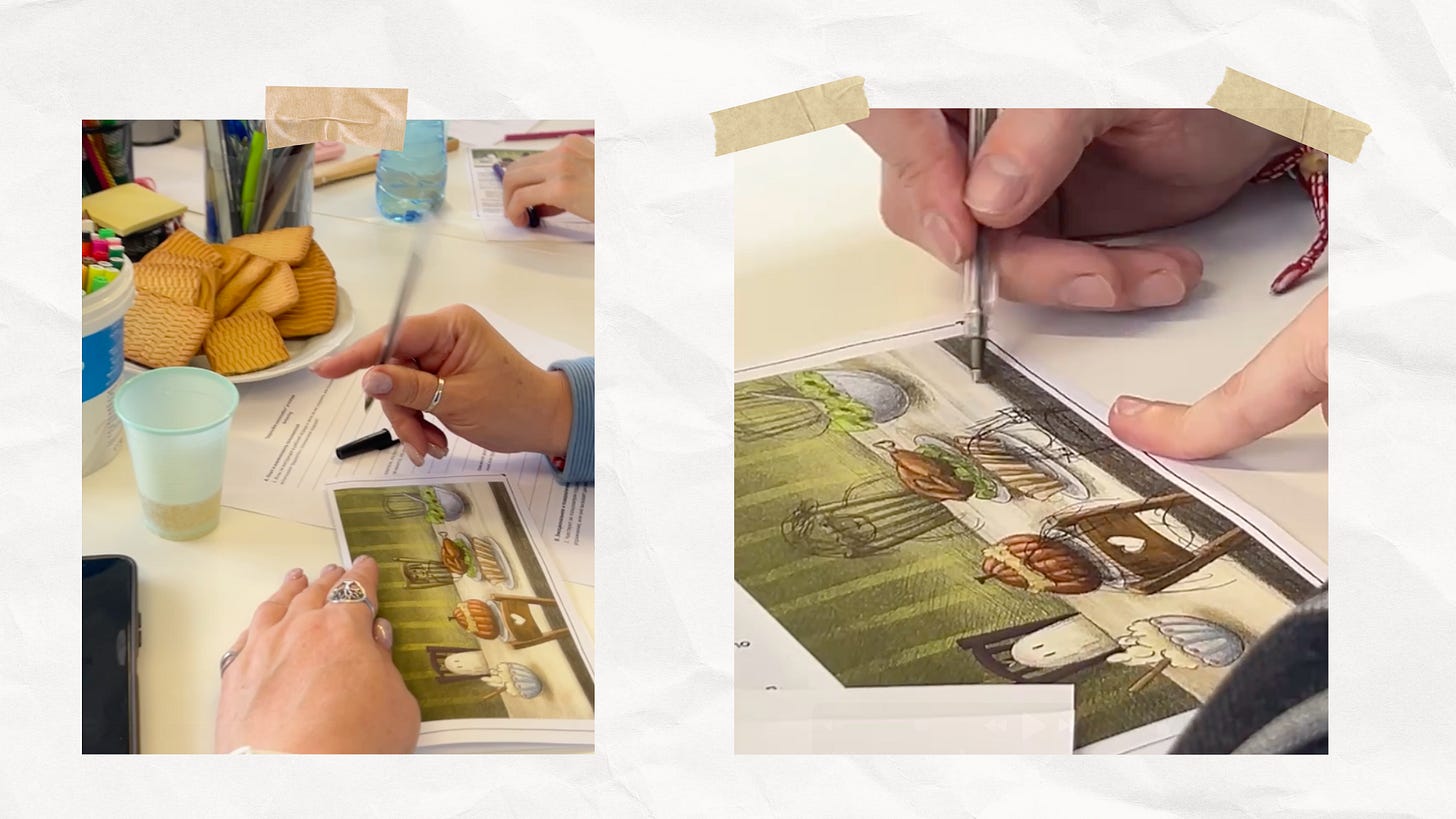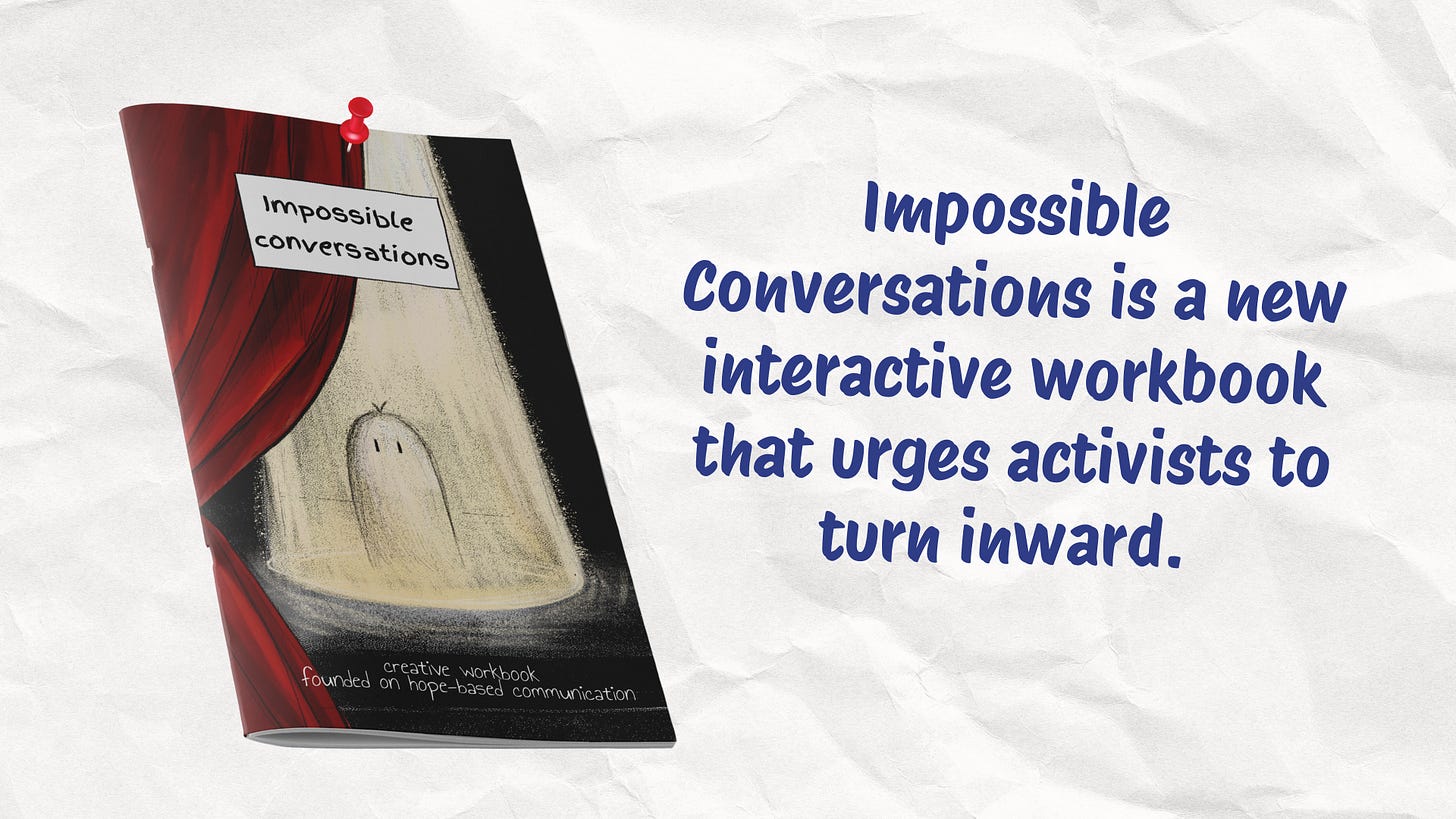How do we make space for the conversations we avoid? 💡
This new tool for changemakers explores how creative reflection can support emotional resilience in divided societies.
In this edition of REWIRE Democracy, we’re spotlighting Impossible Conversations: a civil society prototype born out of the REWIRE Incubator that offers a different approach to one of the greatest challenges facing activists today: emotional exhaustion.
Where Hope Box turned collective visions of a better future into bold visual storytelling, Impossible Conversations takes a quieter path. It turns inward.
Before public dialogue, before strategy meetings or media statements, there’s a moment many of us skip: the conversation with ourselves.
This is where Impossible Conversations begins.
What are impossible conversations, really?
When you hear the phrase “impossible conversations,” maybe you imagine a high-stakes political debate or a heated family dinner.
But what if the hardest conversations aren’t the ones we have with others, but the ones we have with ourselves?
Created by REWIRE Incubator participant Anna Hakman (chairman of Bulgarian integration and inclusion organisation Arms Wide Open), Impossible Conversations is a reflective, art-based tool designed to help people pause, process, and reconnect. It’s not therapy, and it’s not about fixing conflict.
It’s a notebook. Filled with comics, prompts, illustrations, and space to doodle or reflect. And it’s not just about facilitating big debates or political dialogues. It’s about an even harder conversation that we need to have: with ourselves.
It helps you ask, without pressure: What do I feel? What’s hard to say out loud? What’s really going on under the surface?

Civil society needs to slow down
“Today’s world is saturated with emotional, informational, and social overload,” Anna says. “Many people carry complex emotional experiences they struggle to name or share. These ‘impossible conversations’ aren’t just personal—they're also shaped by social taboos, cultural silences, and fractured identities.”
“Today’s world is saturated with emotional, informational, and social overload.”
At the same time, societies across Europe are facing increasing polarization. If young people don’t have safe, creative ways to explore and express what's within, these suppressed tensions risk turning into apathy, conflict, or radicalization.
“This is why we created a creative, emotionally safe tool to help individuals externalize, reflect, and reconnect: with themselves, each other, and the democratic values we want them to carry forward,” she explains.
And that’s why this project can be an essential tool for activists, educators, and volunteers who are expected to show up with clarity and strength, even when they’re at their limit.
→ Read more about how changemakers can (and should) build their resilience

Not “woo-woo,” just necessary
Let’s address the stereotype: practices like journaling, drawing, or mindfulness are often dismissed as fluffy or self-indulgent. Civil society spaces, particularly those focused on democracy, have been slow to recognize their value.
But what if these practices aren’t soft at all?
At REWIRE, we see them for what they are: strategic, and necessary.
This isn’t just self-help. It’s about giving leaders tools to stay grounded, empathetic, and creative—especially in moments of crisis.
A new kind of innovation, from prototype to practice
The idea for Impossible Conversations emerged from a simple observation: when people feel overwhelmed, they doodle in the margins. “We noticed this instinct,” Anna says. “It’s a way to focus and self-soothe. We wanted to turn that into an intentional practice.”
Impossible Conversations doesn’t promise solutions or quick fixes. It offers something more radical: space. Space to think, to feel, and to pause. Space to be a human before being a leader. To feel before reacting. To respond with intention rather than impulse. And in our increasingly reactive environments, that pause can make all the difference.
In today’s emotionally charged environments, that instinct (and this workbook) is more valuable than ever.
Anna’s insight formed the basis for one of three projects chosen to enter a prototyping phase through the REWIRE Incubator.
In another context, this project might have been a creative journaling exercise. But the incubator gave Anna the structure to test, refine, and reframe it as a civic tool.
Supported by peer feedback and real-world testing, Anna iterated through multiple rounds of development. This learning process revealed what worked and, crucially, what didn’t. This allowed those leading the projects to experiment (and fail) with their idea over several iterations.
“REWIRE didn’t just influence the content of the project, it transformed how we approach difficult conversations,” Anna says.
The result is a prototyped project rooted in hope-based communication, but grounded in real civic needs: how do we stay emotionally resilient in the face of burnout, polarization, and pressure?
And how might emotional clarity before a conversation improve what happens after?
What’s inside the workbook?
Inside the notebook, you’ll find visual journaling pages, comics, and drawing prompts designed to surface difficult emotions without demanding immediate resolution.
It invites users to slow down, observe, and name their experiences—without having to explain or defend them. This shift away from judgment opens up deeper understanding.
And in politically tense contexts, it creates space for honesty without rushing toward resolution.
Impossible Conversations is being tested in trauma workshops, peacebuilding efforts, and dialogue initiatives—particularly in contexts where direct verbal exchange may be too volatile. Its strength lies in making space for emotions to emerge before jumping into problem-solving.
As Anna puts it: “In polarized environments where words are weaponized or identities politicized, the creative language of art becomes a neutral space. A place to feel before responding.”

Inner work is civic work
Civil society today is overstretched, under-resourced, and increasingly under pressure. We’re expected to respond quickly, to always be strategic, articulate, and strong. But what if strength looked different?
We are living through a paradigm shift—and that means we need new tactics, even if they challenge traditional approaches.
As Anna advises: “Start with space, not structure. You don’t need to jump into hard topics right away. Creating a safe and welcoming environment is already a conversation.”
This notebook doesn’t claim to resolve conflict. It creates the space around it.
Impossible Conversations reminds us that inner work is civic work. Sitting with discomfort, reflecting honestly, and making space for emotion isn’t a weakness, it’s a strength.

Let’s make space for impossible conversations
This project is in its prototyping phase and open to collaboration. If you’re a facilitator, educator, nonprofit leader, or civil society leader interested in testing the toolkit or adapting it for your work, you can reach out to Anna and the Arms Wide Open team at:
Website: www.armswideopen.eu
Email: info@armswideopen.bg
Instagram: @armswideopenbg
Facebook: facebook.com/armswideopenbg
In our next edition of the REWIRE Democracy Substack newsletter, we’ll share the story of CrossCover, a youth-led, crowd-sourced magazine tackling identity, alienation, and civic belonging through storytelling.
Subscribe to get it delivered to your inbox:
And if you know someone who needs to hear this message, someone quietly doing the hard inner work behind the scenes, forward this post their way.
Together, we can make space for more impossible conversations.







